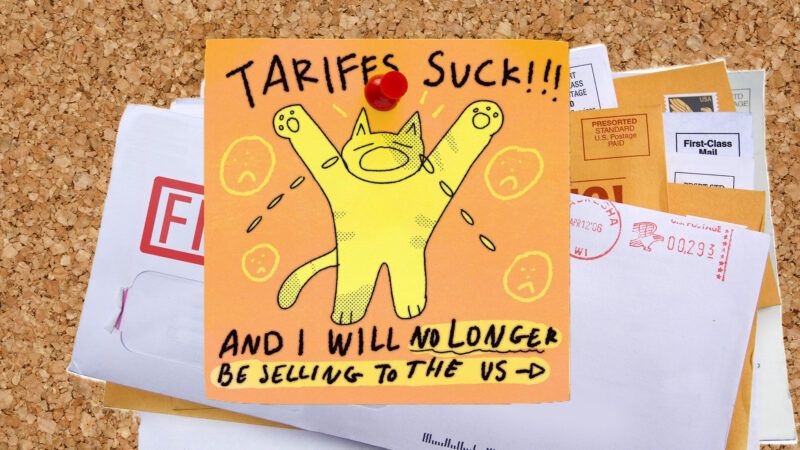Closure of Tariff Loophole for Mail, Packages Puts Millions of Everyday Transactions at Risk
European postal services are cutting off delivery to the United States, leaving entrepreneurs and consumers scrambling.

With tariff uncertainty on the rise, illustrator Robyn Kearns broke the bad news to their tens of thousands of followers on Instagram: No more funny cat pictures would be coming to America, at least for a while.
"Tariffs suck!!!" Kearns scrawled across a sketch of a bawling yellow kitty.
For the 27-year-old illustrator, whimsical sketches of cats playing hockey, decorating Christmas trees, and doing other sundry human activities began as a bit of fun but soon became a nice little side gig that now helps pay the bills—and, Kearns hopes, the pictures bring a little joy into their customers' lives. Those deliveries and that portion of Kearns' livelihood are now on hold.
"It's mainly not wanting my customers to end up with a big charge, and it's so confusing," Kearns told Reason last week. "I'm just stopping all shipping until I actually know what's going on."
What's going on is the elimination of a longstanding rule that allowed goods valued at less than $800 to arrive in America via international mail without paying any tariffs. According to U.S. Customs and Border Protection data, 1.36 billion packages that qualified for the exemption arrived during 2024.
That so-called "de minimis" exemption is scheduled to end on Friday, per an executive order signed by President Donald Trump. That is causing mail-order services that provide everything from niche Japanese fashions to boutique Italian espresso beans and craft Belgian beers to, yes, funny sketches of cats, to scramble for answers. And it means that American consumers of those goods could face tariff bills for anything they buy from overseas. A $500 purchase from Europe, for example, will come with an added $75 tax to cover the 15 percent tariff.
If they can get those things, that is. If Kearns hadn't made the decision last week to cut off orders to the U.S., those shipments would have likely been blocked anyway. On Monday, the U.K. Royal Mail said it would halt shipments to the United States while awaiting more clarity on the new rules for imported parcels. Postal services in Germany, France, Italy, and several other European countries have also suspended shipments to the United States or said they plan to do so in the coming days.
Ending the de minimis exemption comes with serious costs for Americans. A 2024 paper by economists from Yale and the University of California concluded that ending the de minimis exemption would "reduce aggregate welfare by $10.9-$13.0 billion and disproportionately hurt lower-income and minority consumers," who are more likely to purchase items that qualify for the exemption.
And if the result of the new policy is a long-term disruption of international mail into the United States, the costs will fall on people like Kearns, too. The decision to halt shipments to the U.S. means saying goodbye to about 80 percent of the orders Kearns receives via Etsy and other online platforms.
"October is when things really start ramping up for me for Christmas, which, next to Valentine's, is usually my busiest time frame," Kearns told Reason. "If it's still risky for me to send stuff to the U.S. by then, I'm going to lose a massive amount of business."
In one sense, the fact that Americans can't purchase Kearns' funny cat pictures probably seems like an insignificant thing. As the costs of Trump's trade war go, this isn't a loss that will show up in many economic analyses or make Americans materially worse off, as other parts of the trade war certainly will.
And yet, these things do matter. As a matter of principle, if someone in America wants to exchange a few dollars for a sketch of a cat splashing through a puddle that's drawn by a specific British illustrator, why should the federal government have cause to intervene? Why should that shipment incur a prohibitively high tax when it enters the country?
Indeed, the fact that we're talking about funny illustrations of cats here ought to underscore the absurdity of the Trump administration's decision to end the de minimis exemption in the first place. This is what counts as a serious national security or economic threat to the country these days? There is no apparent crisis that requires such dramatic federal action, or the closure of an exemption that is not endangering anyone.
And we're not only talking about cat pictures. The mail is fundamental to lots of global commerce, but it's also a way for people to send gifts to loved ones or buy unique items not available in the United States. All of that is now subject to higher taxes, with no clear rationale for how those tariffs will help the president negotiate better trade deals or reshore manufacturing jobs or whatever other shifting and ill-defined goals the White House is using to justify its trade policies this week.
It illustrates that the cost of tariffs and other barriers to free trade is not always obvious—and is about more than just the dollar figures. Tariffs make Americans materially poorer, yes, but they also make the world a less fun, less whimsical place.
